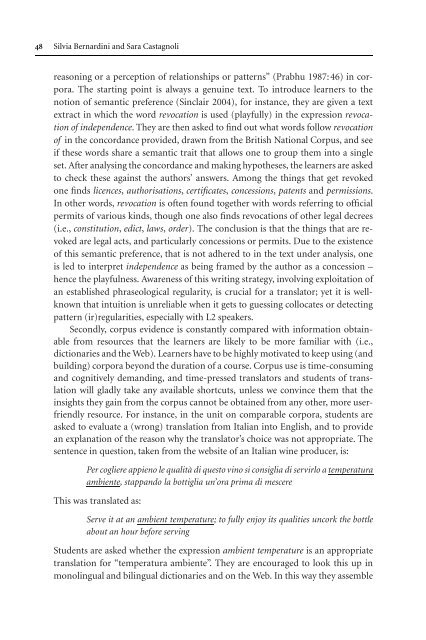Topics in Language Resources for Translation ... - ymerleksi - home
Topics in Language Resources for Translation ... - ymerleksi - home
Topics in Language Resources for Translation ... - ymerleksi - home
- No tags were found...
Create successful ePaper yourself
Turn your PDF publications into a flip-book with our unique Google optimized e-Paper software.
48 Silvia Bernard<strong>in</strong>i and Sara Castagnolireason<strong>in</strong>g or a perception of relationships or patterns” (Prabhu 1987:46) <strong>in</strong> corpora.The start<strong>in</strong>g po<strong>in</strong>t is always a genu<strong>in</strong>e text. To <strong>in</strong>troduce learners to thenotion of semantic preference (S<strong>in</strong>clair 2004), <strong>for</strong> <strong>in</strong>stance, they are given a textextract <strong>in</strong> which the word revocation is used (playfully) <strong>in</strong> the expression revocationof <strong>in</strong>dependence. They are then asked to f<strong>in</strong>d out what words follow revocationof <strong>in</strong> the concordance provided, drawn from the British National Corpus, and seeif these words share a semantic trait that allows one to group them <strong>in</strong>to a s<strong>in</strong>gleset. After analys<strong>in</strong>g the concordance and mak<strong>in</strong>g hypotheses, the learners are askedto check these aga<strong>in</strong>st the authors’ answers. Among the th<strong>in</strong>gs that get revokedone f<strong>in</strong>ds licences, authorisations, certificates, concessions, patents and permissions.In other words, revocation is often found together with words referr<strong>in</strong>g to officialpermits of various k<strong>in</strong>ds, though one also f<strong>in</strong>ds revocations of other legal decrees(i.e., constitution, edict, laws, order). The conclusion is that the th<strong>in</strong>gs that are revokedare legal acts, and particularly concessions or permits. Due to the existenceof this semantic preference, that is not adhered to <strong>in</strong> the text under analysis, oneis led to <strong>in</strong>terpret <strong>in</strong>dependence as be<strong>in</strong>g framed by the author as a concession –hence the playfulness. Awareness of this writ<strong>in</strong>g strategy, <strong>in</strong>volv<strong>in</strong>g exploitation ofan established phraseological regularity, is crucial <strong>for</strong> a translator; yet it is wellknownthat <strong>in</strong>tuition is unreliable when it gets to guess<strong>in</strong>g collocates or detect<strong>in</strong>gpattern (ir)regularities, especially with L2 speakers.Secondly, corpus evidence is constantly compared with <strong>in</strong><strong>for</strong>mation obta<strong>in</strong>ablefrom resources that the learners are likely to be more familiar with (i.e.,dictionaries and the Web). Learners have to be highly motivated to keep us<strong>in</strong>g (andbuild<strong>in</strong>g) corpora beyond the duration of a course. Corpus use is time-consum<strong>in</strong>gand cognitively demand<strong>in</strong>g, and time-pressed translators and students of translationwill gladly take any available shortcuts, unless we conv<strong>in</strong>ce them that the<strong>in</strong>sights they ga<strong>in</strong> from the corpus cannot be obta<strong>in</strong>ed from any other, more userfriendlyresource. For <strong>in</strong>stance, <strong>in</strong> the unit on comparable corpora, students areasked to evaluate a (wrong) translation from Italian <strong>in</strong>to English, and to providean explanation of the reason why the translator’s choice was not appropriate. Thesentence <strong>in</strong> question, taken from the website of an Italian w<strong>in</strong>e producer, is:Per cogliere appieno le qualità di questo v<strong>in</strong>o si consiglia di servirlo a temperaturaambiente, stappando la bottiglia un’ora prima di mescereThis was translated as:Serveitatanambient temperature; to fully enjoy its qualities uncork the bottleabout an hour be<strong>for</strong>e serv<strong>in</strong>gStudents are asked whether the expression ambient temperature is an appropriatetranslation <strong>for</strong> “temperatura ambiente”. They are encouraged to look this up <strong>in</strong>monol<strong>in</strong>gual and bil<strong>in</strong>gual dictionaries and on the Web. In this way they assemble
















